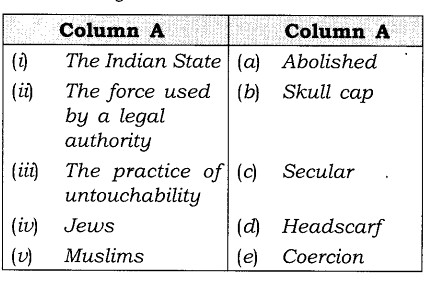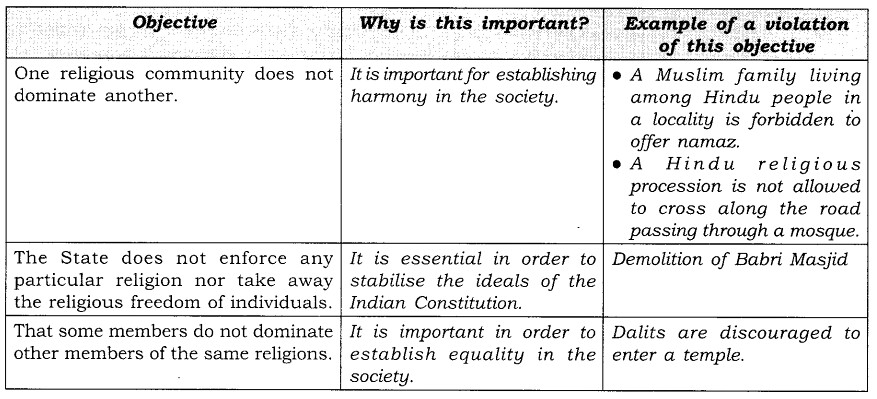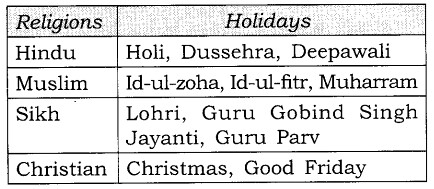Concepts
Secularism involves two basic principles. The first principle says that people of different faiths and sections of the society are equal before the law, the Constitution and government policy. The second principle says that there should be no mixing up of religion and politics.
This means that there can be no discrimination on the basis of religion or faith. There is no room for the hegemony of one religion, or majoritarian religious sentiments and aspirations. There should be separation of religion from politics. The Constitution of India safeguards secularism on these two principles.
People of India are allowed the freedom to practice their religious beliefs in a way each individual finds it suitable. To ensure religious freedom for all, India has adopted a strategy to separate the power of religion and the power of the State.
Importance of Secularism
Secularism is important for each democratic country. More than one religious group lives in almost all countries of the world. There are more chances that one group is in a majority in a given country. If the majority religious group gets access to State power, there is always a risk of the majority group using this power and financial resources to discriminate against people of other religions. This is called the tyranny of the majority. The tyranny of the majority community may result in discrimination, coercion and even killing of people from the minority communities. People from the minority communities can be easily prevented to practice their religion in such a situation. Religious domination in any form is in violation of the rights which a democratic country guarantees to each citizen irrespective of religion. So, it is important to separate the State and religion in a democratic country.
Some people may want to exit from their religion, in order to embrace another religion. Some people may want to interpret religious teachings differently. Such freedom needs to be protected. So, it is necessary to separate religion from the State in a democratic society.
Indian Secularism
The Indian Constitution mandates that the Indian State be secular. According to the Constitution, only a secular State can realise its objectives to ensure the following:
One religious community does not dominate another
Some members do not dominate other members of the same religious community
The State does not enforce any particular religion nor take away the religious freedom of individuals.
The Indian State works in various ways to prevent the domination of majority community. First, it uses a strategy of distancing itself from religion. The Indian State is not ruled by a religious group and nor does it support any one religion. In India, government spaces like law courts, police stations, government schools and offices are not supposed to display or promote any one religion.
The second way in which Indian secularism works to prevent the domination of the majority community is through a strategy of non-interference. But there are some exceptions to the principle of non-interference. In certain cases, the government does interfere in religious matter. Sometimes, this is done to maintain the peace in the society. Sometimes, it is done in order to safeguard and promote the cultural identity of a particular community.
The Indian State is secular and works in various ways to prevent religious domination. The Indian Constitution guarantees Fundamental Rights that are based on these secular principles. But violation of these rights takes place in Indian society. There are some constitutional mechanisms in place to prevent such violations.
Questions & Answers
Multiple Choice Questions:
(i) Which one is a correct statement with regard to Saudi Arabia?
(a) Non-Muslims can gather in a public place for prayer.
(b) They cannot build a temple, church, etc.
(c) They can live in their own way.
(d) None of the above
(ii) The most important aspect of secularism is its …………
(a) separation of religion from State power
(b) separation of politics from religion
(c) separation of one community from another
(d) mixing of religion with State power
(iii) The government cannot force Sikhs to wear a helmet while driving two-wheelers because ………..
(a) Sikhs are very powerful
(b) they do not obey government rules
(c) they look handsome in pagri
d) wearing a pagri is a very important part of Sikh religion
(iv) In American secularism, there is a …………
(a) the strict separation between religion and the State
(b) the loose separation between religion and the State
(c) the strict mingling of religion with the State
(d) the strict rule that contracts all religions
Answer:
(i) (b), (ii) (a), (iii) (d), (iv) (a).
II. Fill in the Blanks.
Fill in the blanks with appropriate words to complete each sentence.
- The intervention of the State can also be in the form of ………….
- In the United States of America, most children in government schools have to begin their school day reciting the
- ‘Pledge of ……………….
- The most important aspect of secularism is its separation of religion from …………. power.
- Government schools don’t celebrate any ………….. festivals on the school premises.
- The Indian State is not ruled by a ……………….. group and nor does it …………… any one religion.
Answer:
- support
- Allegiance
- state
- religious
- religious, support
III. True/False
State whether each of the following statements is True or False.
- In Indian secularism, the State is not strictly separate from religion.
- Wearing a pagri is central to a Sikh’s religious practice.
- Government schools can promote any one religion.
- The Indian Constitution does not grant religious communities to set up their own schools and colleges.
- In Indian secularism, the State cannot intervene in religion.
Answer:
- True
- True
- False
- False
- False
IV. Matching Skills
Match the items given in Column A correctly with those given in Column B.

Answer:
(i) (d), (ii) (e), (iii) (a), (iv) (b), (v) (c).
Very Short Answer Type Questions
Question 1. What examples does history provide us on the grounds of religion?
Answer: History provides us with several examples of discrimination, exclusion, and persecution on the grounds of religion.
Question 2. What happened in the Jewish state of Israel?
Answer: Muslim and Christian minorities were treated badly in the Jewish state of Israel.
Question 3. How are non-Muslims treated in Saudi Arabia?
Answer: In Saudi Arabia, non-Muslims are not allowed to build a temple, church etc. They also cannot gather in a public place for prayers.
Question 4. What does the term ‘secularism’ refer to?
Answer: The term ‘secularism’ refers to the separation of the power of religion from the power of the State.
Question 5. What do you mean by the freedom to interpret’?
Answer: ‘Freedom to interpret’ means an individual’s liberty to develop his own understanding and meaning of the religion that one practices.
Question 6. Why cannot government schools celebrate religious festivals?
Answer: Government schools cannot celebrate religious festivals because it will be a violation of the government’s policy of treating all religions equally.
Question 7. Why is Paramjit allowed to drive in pagri?
Answer: Paramjit is a Sikh youth and for him wearing a pagri is a very important part of his religion.
Question 8. How is Indian secularism different from that of American secularism?
Answer: Unlike Indian secularism, there is a strict separation between religion and the State in American secularism.
Question 9. What is meant by ‘principled distance’?
Answer: This means that any interference in religion by the State has to be based on the ideals laid out in the Constitution.
Long Answer type questions:
Question 1.: Will the government intervene if some religious group says that their religion allows them to practice infanticide? Give reasons for your answer.
Solution: Yes, the government will and should intervene because this practice is against the right to freedom to live. Moreover, it is a crime to kill or practice infanticide.
Question 2. List the different types of religious practices that you find in your neighbourhood. This could be different forms of prayer, worship of different gods, sacred sites, different kinds of religious music and singing, etc. Does this indicate freedom of religious practice?
Answer: Different types of religious practice:
(i) Jagran
(ii) Kirtan
(iii) Namaj
(iv) Mass
(v) Havan
Yes, this indicates freedom of religious practice.
Question 3. Will the government intervene if some religious group says that their religion allows them to practice infanticide? Give reasons for your answer.
Answer: The government will surely intervene if some religious group says that their religion allows them to practice infanticide. Needless to say that the practice of infanticide is a crime. Under this practice the life of a newly-born child is killed. The law does not allow anyone to kill a life.


Answer: Holidays in a school calendar for different religions:

Question 6. Find out some examples of different views within the same religion.
Answer: Different views are followed even within the same religion. As for example, only in the Hindu religion, we have hundreds of deities worshipped by different groups of people. Similarly, in the Muslim community, there are Shiyas and Shunnis. In Jainas, there are Shwetambar and Digambar sects. In Buddha Dharma, there are Hinayaans and Mahayaans.
Question 7.The Indian State both keeps away from religion as well as intervenes in religion. This idea can be quite confusing. Discuss this once again in class using examples from the chapter as well as those that you might have come up with.
Answer: India is a land of complex ideas. It is difficult to understand what it really wants. There are many ideals in the Constitution but practices are quite different from them. In many cases we see laws explain a concept in a different way. But people interpret it differently. Law itself in some cases acts differently. As for example, in secular state law has nothing to say in any of the practices of the religion but when the dominance of upper castes in religion was brought to question the law took favour of the lower castes. This interference of the State creates confusion.

